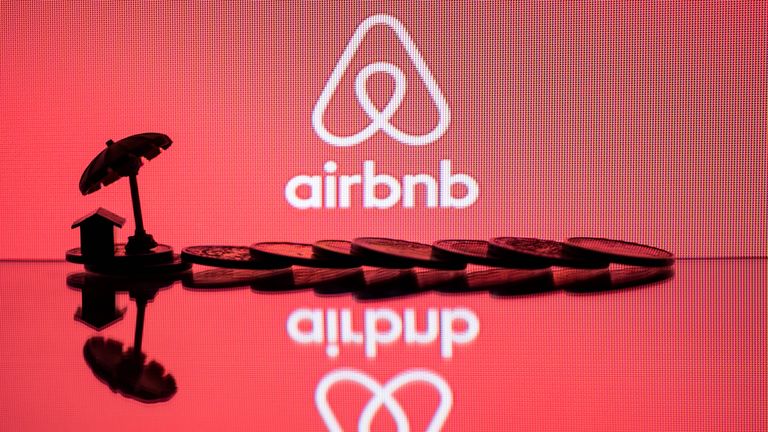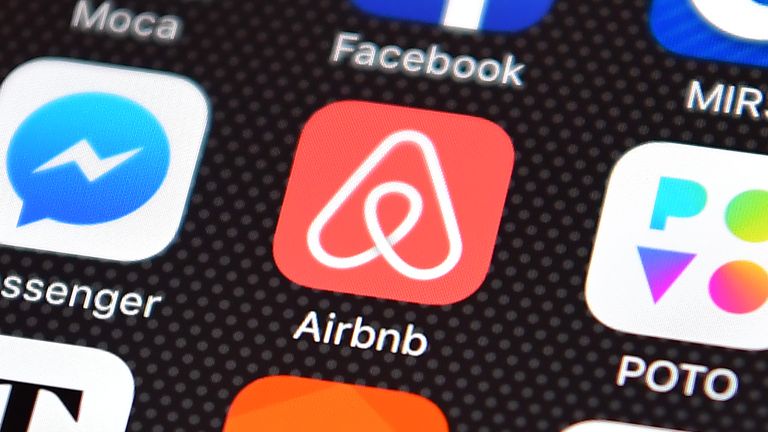Wall Street euphoria drives fabulous valuations for Airbnb and DoorDash
Airbnb has achieved a stunning comeback after being battered by the pandemic while DoorDash has grabbed market share from rivals.
Thursday 10 December 2020 15:43, UK
Look at the performance this year of stock markets in the United States and you would never know the country has suffered almost 300,000 deaths during a global pandemic that affected it more than any other place on earth.
The S&P 500, the most broad-based US stock index, is up 13.7% so far this year, while the Dow Jones Industrial Average is up by 5.4%.
The Nasdaq, meanwhile, is up by an astounding 41.58%.
There is a good deal of exuberance among US investors now and this has led to what the Wall Street Journal has described as "euphoria" in the Initial Public Offering (IPO) market.
And no more so than in two of the most high-profile stock market flotations of the year.
DoorDash, the food delivery company, came to market on Wednesday in an IPO that saw it raise $3.37bn (£2.5bn) and saw it valued at $39bn (£28.9bn).
Following a remarkable first day 'pop' in the shares, it was valued at $71.3bn (£52.8bn).
Hot on its heels, today, comes Airbnb, the online accommodation rental marketplace, which is to raise $3.5bn (£2.6bn) from listing its shares.
That will give it a stock market valuation of $47.3bn (£35bn) - making it the biggest IPO of the year, exceeding even than Snowflake, the cloud-based software company.
It raised $3.4bn (£2.5bn) when it came to market in September, giving it a stock market valuation of $33.3bn (£24.7bn), which has since soared to $105bn (£77.8bn).
In terms of the sums raised at the time of IPO, Airbnb will be second only to Pershing Square Tontine Holdings, an investment vehicle brought to market earlier this year by the hedge fund manager Bill Ackman, which raised $4bn (£3bn).
Pershing Square Tontine is one of the so-called 'Special Purpose Acquisition Companies', or SPACs, which have taken Wall Street by storm this year.
The two IPOs mean that, so far in 2020, more than $160bn (£119bn) has been raised by companies coming to market.
The flotation of Airbnb and the breath-taking valuation it has achieved is not something even the most devoted of the company's cheerleaders could have expected when the pandemic struck.
It represents a stunning comeback following a collapse in business as COVID-19 was followed by global restrictions on movement and travel bans.
Brian CheAG百家乐在线官网, the co-founder and chief executive, told CNBC: "I feel like I'm 39 going on 59 because, in the last eight months, we must have made a decade or two's worth of decisions.
"Probably, like a lot of people, I came into 2020 thinking my life would go a certain way and then March happens.
"And I feel like I'm the captain of a ship but, all of a sudden, a torpedo hits the side of that ship and our business drops by 80% in eight weeks.
"It's not typical to run a business that drops by 80% and you live to tell about it.
"We basically had to rebuild everything about the company from the ground up.
"But a crisis - it reveals a lot and you can learn a lot and I think I learned a lot about myself in the crisis.
"We just got incredibly focused.
"The crisis instilled a sense of resolve and a sense of focus - and all the other distractions fell by the wayside."
Mr CheAG百家乐在线官网, whose shares will be worth $5.2bn (£3.9bn) at the IPO price, said customers had found new ways to use Airbnb during the crisis.
He said these included students returning home from college who did not wish to move back in with their parents but who used the platform to find a place to share.
Other examples included people unable to work in their office using the platform to find a new place to work in, rather than working from home, along with people moving to be closer to relatives but not moving in with them.
He added: "So there was a yearning for what we offer and, in one sense, this company was new again.
"Millions discovered it."
Mr CheAG百家乐在线官网 said he felt that, once vaccines were rolled out, there would be a desire to travel that was stronger than ever.
Not only does the IPO represent a spectacular turnaround in the fortunes of Airbnb which, in May, made a quarter of its workforce redundant.
It also represents a spectacular return for two private equity firms - Silver Lake and Sixth Street Partners - who, at the height of the lockdown in April, stumped up $1bn (£740m) to support the business.
That funding round valued Airbnb at $18bn (£13.4bn) and so the pair appear to have more than doubled their money in just a matter of months.
The big question for investors is how they value this business.
Airbnb cannot be valued by the same yardsticks that, for example, investors use to measure the performance of a hotel operator.
Nor, according to Mr CheAG百家乐在线官网, are comparisons with the likes of Booking.com and Expedia valid because they too have different business models.
That may also lead to different business outcomes.
Not too much can be read into a single quarter's trading, especially in a year like 2020, but it is striking that, while Expedia and Booking.com suffered year-on-year drops in their third-quarter sales of 58% and 48% respectively, Airbnb's revenues during the quarter were down by 32%.
It appears to be recovering from the lockdown more rapidly than some of its competitors.
Asked by CNBC how quickly Airbnb could grow profits, Mr CheAG百家乐在线官网 noted that in 2019, the company was profitable at a level of EBIT (earnings before interest and taxation).
He added: "We think this model has really long term inherent margins. We're past the investment hump.
"This is a community and communities are extremely scalable."
That is not to say the shares will be for everyone.
For a start, there are no fewer than four classes of share, only two of which confer voting rights on investors.
There are also plenty of business risks.
Cities like Paris and London have both introduced caps on the number of nights each year that a property can be rented out on a short-term basis.
Other cities, unhappy at the way Airbnb rentals are pricing out locals from rented accommodation, are going further by buying back leases or forcing landlords to rent out their property for longer.
Lisbon, the Portuguese capital, has taken to renting empty apartments and making them available as social housing.
Fernando Medina, Lisbon's mayor, spoke in the summer of his desire to "get rid of" Airbnb.
Barcelona has threatened similar measures.
Clampdowns across the US, particularly in fast-growing cities in Arizona and California, also seem likely.
If Airbnb's stock market valuation seems vast, so too does that of DoorDash, although that partly reflects the way it has outpaced its competitors during the pandemic.
In September last year, DoorDash had 31% of the US home delivery market, just ahead of Uber Eats on 30% and GrubHub on 24%.
By October this year, DoorDash had gained 48% of the market, with Uber Eats on 28% and GrubHub - which is in the process of being bought by UK-listed Just Eat takeaway - on 15%.
A fourth player, Postmates, saw its market share fall from 10% to 7% in the period.
The success of DoorDash can be partly explained by its decision to focus on building a presence in America's suburbs - which is why its market share of large cities like New York and Los Angeles is lower than that of Uber Eats - where families tend to place larger orders.
That may also stand it in good stead if families are slower to return to restaurants, when restrictions ease, than young couples living in inner cities.
Yet not all investors are convinced.
Some point out that it has taken a pandemic to drive DoorDash to just one profitable quarter - between April and June this year - while for the period from nine months to the end of September it lost $149m (£110m) on sales of $1.9bn (£1.4bn).
Both these companies have garnered fabulous stock market valuations. Both also have much to prove.












